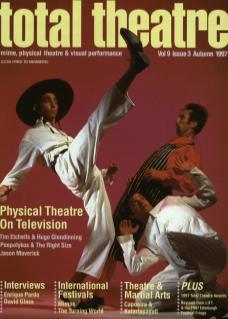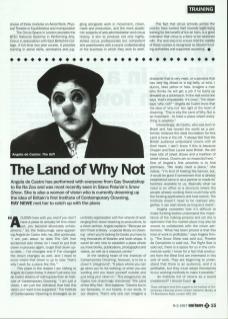‘A clown lives with you and if you don't have a place to actually let this clown out, you become absolutely schizophrenic.’ So the reassuringly sane-appearing Angela de Castro tells me. She continues: ‘I am just about to redo The Gift (her acclaimed solo show) so I need to put that clown in process again, to get that clown up-to-date... I've changed and if I've changed the clown changes as well, and I need to know where that clown is up to now. That's why I wish for a place like this.’
This place is the reason I am talking to Angela de Castro today. It doesn't yet exist, but de Castro dreams of nothing less than an Institute of Contemporary Clowning. ‘I am just a clown. I am just the individual that had this vision, so I need to be supported.’ The Institute of Contemporary Clowning is envisaged as an umbrella organisation with five strands of work ranging from clown-teaching to productions, to a clown archive. Angela explains: ‘Because we don't have a library – a special library on clowning – when you're looking for books you have to ring thousands of libraries and book shops. It would be very nice to establish a place where you have books, publications, photographs and videos, as well as a resource centre.’
At the beating heart of the Institute of Contemporary Clowning, however, is to be a clown's 'playground'. ‘A place where you can go when you're not working, or when you are working and you leave yourself outside and just bring your clown in.’ This playground, de Castro has charmingly christened 'The Land of the Why-Not'. She explains: ‘Clowns live in our fantasies, in our hearts, in our souls, in our dreams. That's why one can imagine a character that is very inept, or a persona that has very big shoes or a big belly, or who, dunno, likes yellow or hats. Imagine a man who thinks he will get a job if he turns up dressed as a cockroach. In the real world one says “that's impossible, it's crazy”. The clown says “why-not?”’ Angela de Castro feels that the idea of 'why-not' lies right at the heart of clowning. ‘This is why the Land of Why Not is so important – to have a place where every thing is possible.’
Interestingly, de Castro, who was born in Brazil and has toured the world as a performer, believes the ideal foundation for this Land is here in the UK. ‘I always feel that the British audience understand clowns with all their heart. I don't know if this is because Chaplin and Stan Laurel were British. We still have lots of street shows and a tradition of street shows. Clowns are so respected here.’ One of Angela's first priorities is to find premises. ‘We really need a place,’ she insists. ‘I'm kind of holding the banner, but, it would be good if somewhere that is already established came in as a partner or made its facilities available to us. Basically what we need is an office or a structure where the people already working there could help with the funding applications and host events. The Institute doesn't need to be realised altogether, it can start slowly as long as it starts.’
Angela concedes that it's difficult to make funding bodies understand the importance of the making process and yet she is optimistic that the marketplace may also be wooed to collaborate with the clown performers. ‘What has been proved is that this kind of work is profitable,’ says Angela firmly. ‘The Snow Show was sold out, Theatre de Complicite is sold out, The Right Size is sold out, there is a space for us in the commercial world. I know for a fact that producers from the West End are interested in this sort of work. They are beginning to understand that there is an audience, and it is profitable, but they must adapt themselves to our working methods to make it possible.’
An Institute full of clowns as a sound investment? I should Coco!

